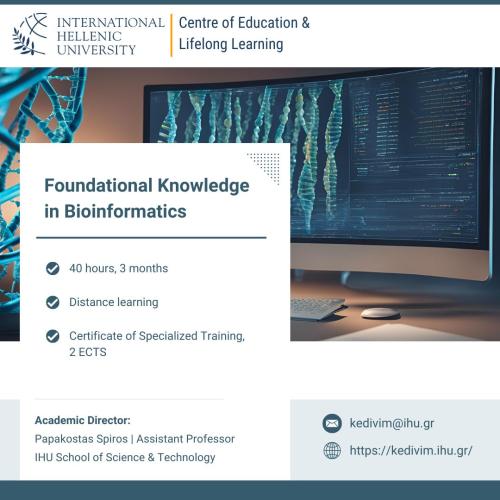28/08/2024 00:00:00 - 11/10/2024 23:59:59
Applications closed
Synchronous distance education
Certificate of Specialized Training
Short description:
Τhe target audience for the course may include individuals from various academic and professional backgrounds who have a keen interest in learning Bioinformatics. In this regards, no particular cut off will be applied. However, the course is primarily designed for biologists, including molecular biologists, geneticists, ecologists, and other life scientists who want to better understand and incorporate bioinformatics into their research. Students of IT background may find the content very basic unless they wish to refresh their knowledge in Python, R, and Unix environment with a molecular biology flavour. This is further meant to be an preparatory course for our dedicated MSc Applied Bioinformatics to those with little or no knowledge in coding.
ECTS: 2
Tuition Details:
Fees will be paid as follows: 200 euros to register and 200 euros after the lecture of Section 3.
Evaluation method:
Αποστολή εργασιών
Scientific director:
ΣΠΥΡΙΔΩΝ ΠΑΠΑΚΩΣΤΑΣ (γνωστικό αντικείμενο: Μικροβιακή και Μοριακή Οικολογία)
Academic director:
ΣΠΥΡΙΔΩΝ ΠΑΠΑΚΩΣΤΑΣ
Basic subject:
Geotechnical Sciences
Subject subcategories:
Biology
Education
Ecology
Environment
Entry Requirements
The teaching language is English. Thus good knowledge of the English language, preferably at level B2, is recommended.
The programme's aim
The aim of the course is to provide participants with a solid understanding of the fundamental principles, techniques, and tools used in the field of bioinformatics. Participants will learn how to generate and interpret Python and R code in the context of biological data.
Educational Objectives
Students will develop proficiency in handling and interpreting computer code, namely Python and R scripts, specific to biological data analysis. Throughout the course, students will also cultivate critical thinking and problem-solving skills by tackling practical bioinformatics challenges. Ultimately, the course aspires to equip students with the foundational knowledge and practical skills necessary to advance careers in biological research, healthcare, or other bioinformatics-related fields, or to pursue further advanced studies in the discipline.
Contact Info
spapakostas@ihu.edu.gr
Academic Staff
The instructor is an Assistant Professor in Microbial and Molecular Ecology with >20 years of experience in the analysis of molecular and ecological data including genomics, transcriptomics, proteomics, epigenomics etc in Greece and aborad (Finland, Netherlands). He is also an instructor of several modules of the English Applied Bioinformatics MSc between the International Hellenic University and the Aristotle University of Thessaloniki.
Teaching Units - Duration
- Section 1 (4 hours): Jupyter IDE & work with variables in Python.
- Section 2 (4 hours): Data types and strings in Python.
- Section 3 (4 hours): Logical Operators in Python.
- Section 4 (4 hours): Python loops and functions.
- Section 5 (4 hours): Pandas & Capstone I: DNA transcriber project; also python dictionaries and Nesting.
- Section 6 (4 hours): Exception handling & Capstone II: biallelic SNP finder project
- Section 7 (4 hours): API & biological databases
- Section 8 (4 hours): Basic Unix commands.
- Section 9 (4 hours): Basic R funcionality.
- Section 10 (4 hours): Visualisation with ggplot2.
Teaching Units - Presentation
- Section 1 (4 hours): Jupyter IDE & work with variables in Python.
- Introduction to Python.
- What are IDEs, Jupyter installation and basic functionality (input, variables etc.).
- Section 2 (4 hours): Data types and strings in Python.
- Data type checking & conversion.
- Interactive coding exercise.
- Mathematical operations.
- Section 3 (4 hours): Logical Operators in Python.
- if/else and conditional operators in Python.
- Nested if statements and elif statements.
- Logical operators in succession.
- Section 4 (4 hours): Python loops and functions.
- Lists and nested lists.
- for and while loops.
- Defining and calling Python functions; functions with inputs and outputs.
- Section 5 (4 hours): Pandas & Capstone I: DNA transcriber project; also python dictionaries and Nesting.
- Introduction to Systems Biology and molecular biology data types.
- Introduction to NGS data types.
- Introduction to Evolutionary Biology and Population Genomics.
- Introduction to Python pandas module.
- Build your own DNA transcriber function.
- Section 6 (4 hours): Exception handling & Capstone II: biallelic SNP finder project.
- Python dictionaries; nesting lists and dictionaries.
- Handling errors.
- Exception handling.
- JSON data.
- Build your wown biallelic SNP finder from NGS data.
- Section 7 (4 hours): API & biological databases.
- Introduction to API.
- Introduction to some basic biological databases.
- The requests Python module.
- Programmatically retrieve data from biological databases.
- Section 8 (4 hours): Basic Unix commands.
- Introduction to Unix.
- awk, sed, grep commands in Unix.
- Example of HPC comptuting (sbatch jobs).
- Section 9 (4 hours): Basic R funcionality.
- Introduction to R.
- The R studio IDE - basic functionality.
- R matrices, data frames, lists.
- R data input and output.
- R programming basics.
- Section 10 (4 hours): Visualisation with ggplot2.
- Introduction to Data Visualisation.
- Basic ggplot2 syntax.
- Geometric Objects.
- Faceting.
- Themes and Styling.



